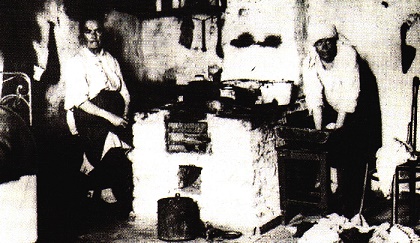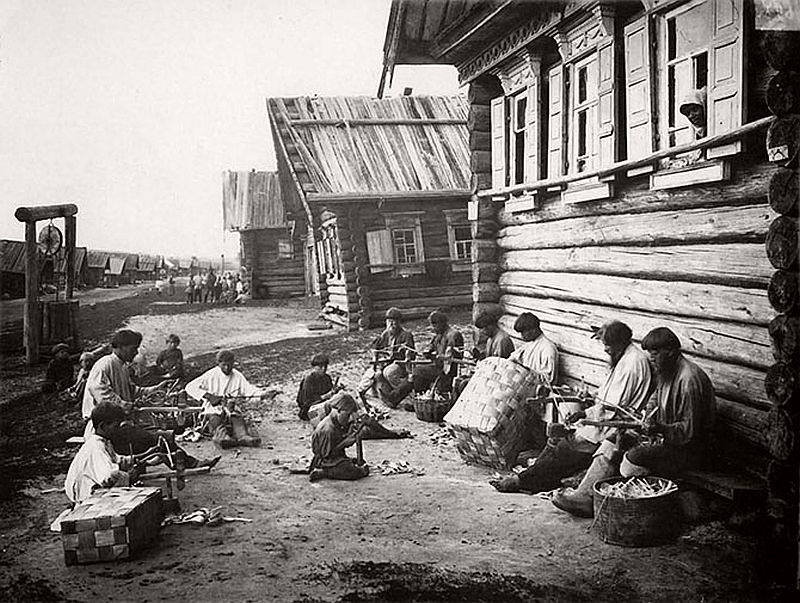
Causes of the March Revolution

Introduction
In March 1917 there was a revolution in Russia. The sequence of events went as follows:
1. Crowds of people rioted on the streets.
2. The soldiers joined them.
3. The members of the Duma joined the revolution.
4. They forced the Tsar to abdicate (resign).
This webpage looks at ten possible causes of these amazing events...
After you have studied this webpage, answer the question sheet by clicking on the 'Time to Work' icon at the top of the page
Links:
The following websites will help you research further:
GCSE Materials:
this johndclare.net GCSE page looks at
Why was there a Revolution in 1917 in more detail
1. Workers' Poverty?
This picture shows a metal worker's home in Petrograd, the capital city of Russia. Forty per cent of families had to share rooms. A report of 1902 described such rooms:
 They are damp and unbelievably dirty ... the plaster is crumbling, there are holes in the walls ... legions of cockroaches and bugs ... it is bitterly cold ... draughts in every corner.
They are damp and unbelievably dirty ... the plaster is crumbling, there are holes in the walls ... legions of cockroaches and bugs ... it is bitterly cold ... draughts in every corner.
Interrogating the sources:
For ALL these sources, looking at all the
details of its
provenance, how true do you think this
account is likely to be?
2. Anger at the events of 1905?
On 22 January 1905, a crowd of poor people had gone on a march to beg the Tsar to help them. They thought he cared for them like a 'father'. But the Tsar ordered the Cossacks to shoot them. A thousand people died. The day became known as 'Bloody Sunday'.
[The crowd goes away.]
A voice said nervously with a sob: 'Our fathers have shown as what they really are!' And somebody else said threateningly: 'We shall never forget this day.'
They walked quickly, in a close-packed crowd, many talking at once, and their voices merged with the dark, angry murmur.
from The Ninth of January, a short story by Maxim Gorki, a Russian writer (published abroad in 1907).
Ninth of January:
Why, do
you think, was Gorki's short story published abroad?
How important a political force is disillusionment?
How long do people hold grudges about things like this?
3. General unrest?
Most of the population is at present in a very troubled mood... People openly complain about the corrupt government, the unbelievable burdens of the war, the unbearable conditions of everyday life. Everybody is saying that 'we are on the eve of great events.'
Police Report for October 1916
World War One:
Think about the
role of the War in the revolution ... would there have
been a revolution without it?
4. Rasputin?
A political cartoon from the time (left) shows Rasputin holding the Tsar and Tsarina in his hands like puppets.

Rasputin:
Compare the
cartoon of Rasputin on the left with the official iconic image of
Nicholas, Alexandra and Alexis on the right.
How does the cartoonist show what he thinks of Rasputin?
How might a cartoon like this harm the government?
5. The Duma?
By 1917, Russia was clearly losing the war. The members of the Duma openly talked about the need to get rid of the Tsar. A coup d'etat is where a small group takes over the govemment .
General Krimov: The army will greet the news of a coup d'etat with joy.
Deputy Shingarev: The general is right a coup d'ιtat is necessary, but who will dare lead it?
Deputy Shidlevsky: We cannot waste pity on the Tsar if he ruins Russia.
quoted in T Downey, The USSR (1989)
6. Young people who just wanted to stir up trouble?
There is a hooligan movement. Young people run and shout that there is no bread, simply to create excitement . If the weather was very cold they would all probably stay at home. But all this will pass and become calm.
Letter from the Tsarina to Nicholas, 10 March 1917
Hooligans:
How much is
this 'cause' about the role of trouble-makers, or about
the complete misunderstanding of the Tsarina of the danger
of the situation?
7. Hunger?
The winter of 1916-1917 was bitterly cold. The winter nights were 18 hours long. There were food shortages, fuel shortages and unemployment. On International Women's Day, 8 March 1917, thousands of people went on protest marches against the govemment.
The workers of the Vyborg district went on strike. They were angry because there was not enough black bread... At about 1 pm, crowds of workmen walked into the streets shouting, 'Give us bread'.
Police Report for 8 March 1917
8. Nicholas II?
On 12 March 1917, the soldiers in Petrograd disobeyed their officers and refused to fire on the crowds. Rodzianko, the President of the Duma, telegraphed the Tsar:
The situation is growing worse.
Something must be done immediately.
Tomorrow is too late. The last hour has struck.
The future of the country and the royal family is being decided.
The Tsar read the telegram and said:
Again, that fat-bellied Rodzianko has written me a lot of nonsense, which I won't even bother to answer.
On 13 March the government lost control of Petrograd. Members of the Duma met the Tsar and forced him to abdicate.
Nicholas II:
Think about the
role of Nicholas II in causing the revolution: he was clearly
incompetent ... but how much difference did this make in
the wider context?
9. An act of cruelty?
Nicolai Poliakoff became famous in Britain in the 1950s as Coco, the clown in Bertram Mills Circus. In 1917, he was living in Petrograd and was an eyewitness to the Revolution; these are his memories.
[The Cossacks had been ordered not to let anybody cross the bridge.]
A tired old man, carrying a dinner-basin tied up in a red handkerchief, tried to push his way through the crowd. A Cossack stopped him. In a thin, piteous voice, the old man explained that if he could reach the other side of the river his daughter might let him have a little food. Looking sadly at him the Cossack refused and turned away. The old man trailed wearily after him...
This annoyed the Cossack's officer... With an angry oath the officer rode up to the old man and slashed him furiously across the face with his riding whip. The old fellow dropped his empty basin and began to cry.
Without a word, the Cossack drew his sabre and killed the officer.
Pandemonium broke loose. The Cossacks killed all their officers... A howling, impassioned mob streamed across the bridge and stormed the public buildings.
The revolution had begun.
From Nicolai Poliakoff, Coco the Clown (1941)
An act of cruelty:
What class would
the Cossack officer have come from?
What class would
the Cossack soldier have come from?
10. Peasant poverty?
A peasant village in Russia. Peasants, however, took no part in the March revolution.
